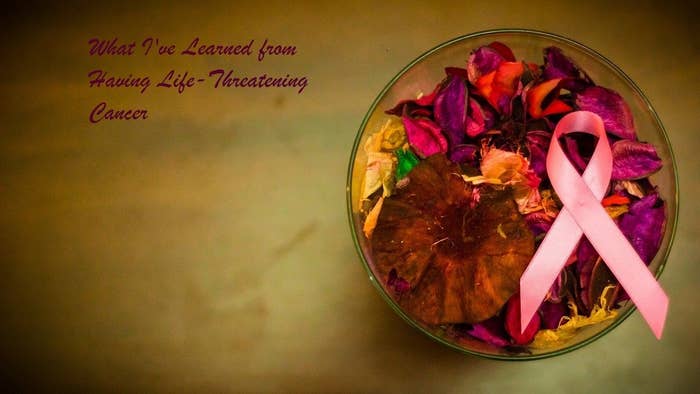
Ten Things I’ve Learned from Having Life-Threatening Cancer
by Carmen Pai Daschke
It was December 2013 and I was standing in the doorway, talking to a friend on the phone, when I crossed my chilly hands under my armpits seeking warmth.
“WHAT the HELL is that?” I said when I felt the lump pressed against my cold fingers. Unfortunately, this was days before Christmas, so there were no clinics appointments to be made where I usually have my mammogram. I had to wait to be seen in January.
From that moment, my life changed. I had just gotten an adjunct professorship at a local college, having left another job that would have included health benefits, but which kept me away from my daughter far too long, and I was in the middle of trying to decide what to do with my life. But when I felt that lump, and received the subsequent confirming diagnosis in February, I knew things were going to be different than the plans I had been building on.
Here’s some of the things that I’ve learned from having life-threatening cancer:
1.Help the people helping you. People, the minute you let them know, reach out with prayers and good wishes. But they also want to know what they can do to help. Think of things you may need, and feel that it’s okay to put them out there: rides to appointments, someone to pack lunches for chemotherapy days, dinners prepared and then frozen for you and your family. Does your kid need help with homework? Ask another parent. Trust me, the list can go on and on. But you need things, and now is the best time to ask and a great way for people to connect their concern to action.
2.Be ready to face that you cannot do it alone. Choose people that you can trust to help you with paperwork, keeping up with your calendar, and other important tasks. In other words, choose an advocate. Have a list of questions that that person can ask your doctors when you forget.
3.About that advocate—a cancer diagnosis can be overwhelming and even when you are finally declared NED (No Evidence of Disease), that doesn’t mean that you are done. You will probably have scans and other appointments frequently. Choosing an advocate may seem easy, but you should probably spread the love out. What I mean is that you cannot burden one person with all this stuff! Pick two or three people who can hopefully stay in touch and share information so that no one feels overwhelmed. Overwhelmed people become angry people, depressed people, resistant people.
4.Keep busy. Instead of crying all day about my diagnosis, I decided to keep doing as many normal things as possible. That job that I just accepted? I love teaching World Religions, so I went ahead, signed the contract, and scheduled my chemotherapy around my teaching schedule. Also, being in chemo gave me a chance to connect my work to my life. I began researching the ways medical professionals relate to patients’ faiths. How can you relate your diagnosis to something in your life that could be very helpful to another cancer survivor?
5.Treat yourself to feel-good things. I knew that laughter and exercise were two things that I could do to boost my immune system. So, I went for walks and watched YouTube videos of my favorite stand-up comedians such as Russell Peters, Maz Jobrani, and Anjelah Johnson’s nail shop bit, to keep me going. I gave myself time to be entertained and distracted by laughing. That is why they call it “the best medicine.”
6.Keep yourself connected. There are many cancer support groups online and in cities across the world. I joined a support group that gave me a chance to listen to stories and share my own. I also made a point of reaching out to others in treatment who were having a hard time or just needed someone to talk to. Sharing the experience creates deep bonds!
7.Reconnect with or find a spiritual practice. Kneel at your bedside, take out your prayer rug, light some incense, or whatever it is you do to get closer to your spiritual self. This is one of those good times to cry (yes, you can and you must. Holding it all in doesn’t help at all!), then to calm yourself, get centered, ask God/the Universe/your own body for healing, then to share that with others, perhaps in your aforementioned support group. Repeat. Often.
8.Be of service. A friend of mine who is an oncology nurse said that she found that the patients who engaged in some form of service were the ones who had the best recoveries, and she encouraged me to do so. I took her up on that, and worked some food drives. Everyone has a story and the people I served helped me to understand that I was one of many with a cross to bear. But nothing beat the smiles and laughter that we shared.
9.Be prepared for the ugly side of people. At some point, people may start falling off, pulling away. Be ready for that, because cancer, and many of the accompanying issues, can eat away at people. I had a friend who dumped me for trading in my raggedy car. I had family dump me for just being sick!!! Sometimes, not being able to fix a situation can make you mad, not the problem, but at the person. It truly sucks, but ultimately, you didn’t decide to get cancer on purpose, so consider it a cleanse.
10.Open up to the new. Recognize that the learning process is continual and that what you have learned and will continue to learn is really about living now, seizing the day, and loving yourself through something extremely difficult. You are worth it. Be well!

